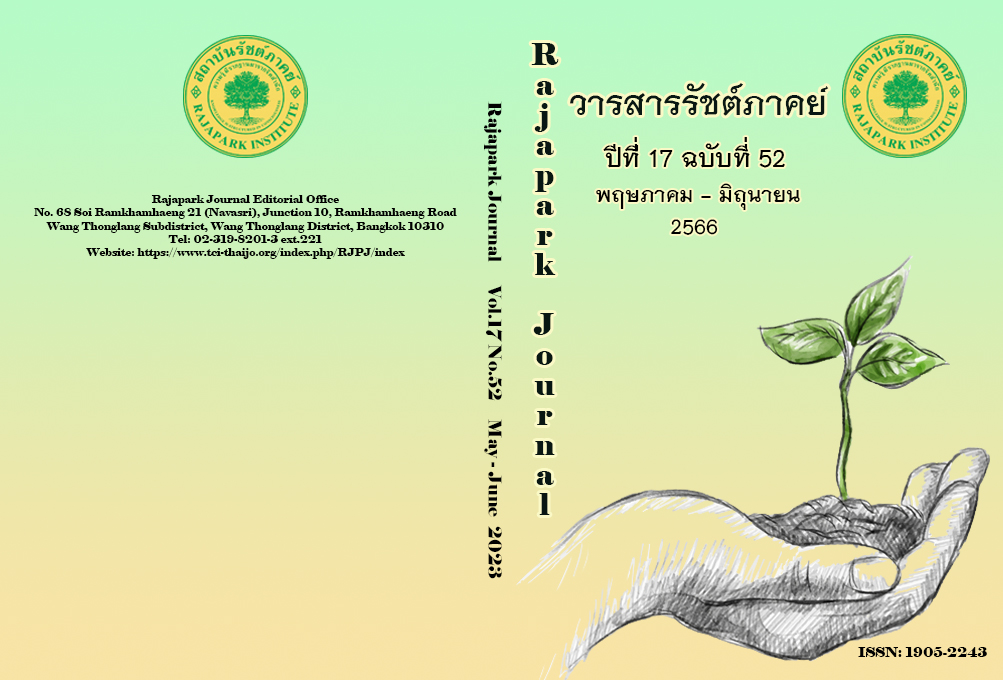กลยุทธ์การจัดการโซ่อุปทานการท่องเที่ยวเพื่อส่งเสริมเศรษฐกิจในเขตพัฒนาการท่องเที่ยววิถีชีวิตลุ่มน้ำโขงอย่างยั่งยืน
Main Article Content
บทคัดย่อ
การวิจัยนี้มีวัตถุประสงค์เพื่อศึกษาปัจจัยโซ่อุปทานที่มีต่อการจัดการท่องเที่ยวในเขตพัฒนาการท่องเที่ยวอย่างยั่งยืน และนำเสนอกลยุทธ์การจัดการโซ่อุปทานการท่องเที่ยวในเขตพัฒนาการท่องเที่ยววิถีชีวิตลุ่มน้ำโขงเพื่อพัฒนาสังคมอย่างยั่งยืน รูปแบบการวิจัยเป็นการวิจัยแบบผสมวิธี กลุ่มตัวอย่างในการวิจัยคือ นักท่องเที่ยวที่มาท่องเที่ยวในเขตพัฒนาการท่องเที่ยววิถีชีวิตลุ่มน้ำโขง ขนาดของกลุ่มตัวอย่างทั้งสิ้น 400 คน เก็บรวบรวมข้อมูลด้วยแบบสอบถาม และแบบสัมภาษณ์ผู้มีส่วนได้ส่วนเสียกับการท่องเที่ยวที่ได้จากการเลือกตัวอย่างแบบเฉพาะเจาะจงจำนวน 12 คน ผลการวิจัยพบว่า โซ่อุปทานการท่องเที่ยวส่งผลต่อการจัดการท่องเที่ยวอย่างยั่งยืนอย่างมีนัยสำคัญทางสถิติ มีค่าสัมประสิทธิ์เส้นทางเท่ากับ 0.99 เมื่อทำการตรวจสอบความสอดคล้องกับข้อมูลเชิงประจักษ์ โดยมีค่าดัชนีชี้วัดได้แก่ค่า X2 = 13.325, df = 7, X2 /df = 1.904, P-value = 0.065, RMSEA = 0.002, CFI = 0.999, AGFI = 0.964 ซึ่งแปลผลได้ว่าค่าทั้งหมดผ่านเกณฑ์ตามค่าดัชนีชี้วัดความสอดคล้องกลมกลืนของโมเดล และตัวแปรทุกตัวสามารถร่วมกันอธิบายความแปรปรวนของประสิทธิผลได้ร้อยละ 91.00 แสดงถึงการมีศักยภาพในการรองรับและให้บริการการท่องเที่ยวของเขตพัฒนาการท่องเที่ยววิถีชีวิตลุ่มน้ำโขง รวมทั้งภาครัฐมีการพัฒนาโครงสร้างพื้นฐาน มีความได้เปรียบทางภูมิศาสตร์ที่สามารถเชื่อมโยงการท่องเที่ยวไปยังประเทศเพื่อนบ้าน และมีความโดดเด่นทางด้านการท่องเที่ยวเชิงธรรมชาติและวัฒนธรรม
Article Details

อนุญาตภายใต้เงื่อนไข Creative Commons Attribution-NonCommercial-NoDerivatives 4.0 International License.
ทัศนะและความคิดเห็นที่ปรากฏในวารสาร ถือเป็นความรับผิดชอบของผู้เขียนบทความนั้น และไม่ถือเป็นทัศนะและความรับผิดชอบของกองบรรณาธิการ
เอกสารอ้างอิง
Al-Aomar, R., & Hussain, M. (2017). An Assessment of Green Practices in a Hotel Supply Chain: A Study of UAE Hotels. Journal of Hospitality and Tourism Management, 32(1), 71-81.
Atasevena, C., & Nair, A. (2017). Assessment of Supply Chain Integration and Performance Relationships: A Meta-analytic Investigation of the Literature. International Journal of Production Economics, 27(185), 252-265.
Bank of Thailand. (2020). How to Switch on the Tourism Sector to be Worth the Risk. Bank of Thailand. https://www.bot.or.th/Thai/ResearchAndPublications/articles/Pages/Article_13Oct2020.aspx
Butler, R.W. (1999). Sustainable Tourism: A State‐of‐the‐art Review. Tourism Geographies, 1(1), 7-25.
Chaivichayachat, B. (2019). Tourism Cluster in Thailand. Journal of Humanities and Social Sciences Nakhon Phanom University, 12(1), 312-328.
Chen, C.F., & Chen, F.S. (2010) Experience Quality, Perceived Value, Satisfaction and Behavioral Intentions for Heritage Tourists. Tourism Management, 31(1), 29-35.
Christopher, M. (2011). Logistics and Supply Chain Management: Creating Value-adding Networks (4th ed.). Prentice Hall.
Chuaikrut, C., Phusanam, A., & Dejmanee, O. (2020). Factors Affect to Tourist Behavior of Thai Teenagers After Invasion of COVID-19. NEU Academic and Research Journal, 10(3), 187-201.
Designated Areas for Sustainable Tourism Administration. (2016). Global Sustainable Tourism Criteria for Destinations. https://tis.dasta.or.th/stisdasta/gstc-lists.
Division of Macro Industrial Policy. (2019). Enhance the Capability of Thai Industry through the Mechanism of the National Industrial Development Board. https://bit.ly/3TorZZu.
Hunter, C. (1997). Sustainable Tourism as an Adaptive Paradigm. Annals of Tourism Research, 24(4), 850-867.
Hussain, M., Khan, M., & Al-Aomar, R. (2016). A Framework for Supply Chain Sustainability in Service Industry with Confirmatory Factor Analysis. Renewable & Sustainable Energy Reviews, 55, 1301–1312.
Kaewkla, K., Matthayamburut, W., Silanoi, L., & Pooripakdee, S. (2017). Personal Factors Affecting Cultural Tourism Decisions in Nakornchaiburin. Academic Journal of Buriram Rajabhat University, 9(1), 23-39.
Kaosa-Ard, M., Untong, A., Tianteerawit, P., Phetvaroon, K., & Kruefoo, N. (2013). Tourism Economics. The Thailand Research Fund.
Li, Y., Hu, C., Huang, C., & Duan, L. (2017). The concept of smart tourism in the context of tourism information services. Tourism Management, 58(1), 293-300.
Ministry of Industry. (2016). Thailand Industrial Development 4.0 strategy for 20 years (2017–2036). Ministry of Industry.
Ministry of Tourism and Sports. (2022). Tourism Statistics. http://bit.ly/3EIlkUL.
Nawakitphaitoon, L., Pongsakornrungsilp, S., & Pongsakornrungsilp, P. (2021). Factor Analysis of Millennial Tourists’ Lifestyles in Thailand. Journal of International and Thai Tourism, 17(1), 18-43.
Nicholas, L., & Thapa, B. (2010). Visitor Perspectives on Sustainable Tourism Development in the Pitons Management Area World Heritage Site, St. Lucia. Environment, Development and Sustainability, 12(1), 839-857.
Noiprom, N., & Kamonchit, N. (2016). Tourism Services Segment: The Recent Economics Propulsion of Loei Province. Research and Development Journal Loei Rajabhat University, 11(36), 1-11.
Office of the National Economics and Social Development Council. (2018). National Strategy (2018-2037). Prime Minister’s Office.
Piboonrungroj, P., & Disney, S.M. (2015). Supply Chain Collaboration in Tourism: A Transaction Cost Economics Analysis. International Journal of Supply Chain Management, 4(3), 25-31.
Research Institute of Strategy & Coordination for Northeastern Development. (2017). Final Report Strategic Development Plan Project for the Lower Northeastern Province Cluster 1 for a 20-year period (2017-2036). Khon Kaen University.
Research and Development Institute, Ramkhamhaeng University. (2019). Lecture Publications of the Workshop Project for Techniques of Interpreting Data and Writing Research Reports. Ramkhamhaeng University.
Sanyanunthana, K., & Benabdelhafid, A. (2016). The Value-Added Tourism Logistics Industry of Thailand. Journal of Tourism & Hospitality, 4(5), 1-6.
Satidporn, W. (2016). Thai Security: Challenges for the Future. King Prajadhipok's Institute Journal, 14(1), 5-25.
Schumacher, R.E., & Lomax, R.G. (2010). A Beginner’s Guide to Structural Equation Modeling (3rd ed.). Lawrence Erlbaum Associates.
Siriborwonpitak, C. (2017). Potentiality and Tourism Development Plan for Maha Sarakham Province. Humanity and Social Science Journal, 8(2), 73-88.
Song, H. (2012). Tourism Supply Chain Management. Routledge.
Song, H., Witt, S.F., & Zhang, X. (2008). Developing a Web-based Tourism Demand Forecasting System. Tourism Economics, 14(3), 445-468.
Soonsan, N., & Sukahbo, S. (2020). Causal Relationships Between Destination Image, Place Attachment, Overall Satisfaction, and Behavioral Intention of Western Tourists in Phuket. Chulalongkorn Business Review, 42(1), 68-83.
Stock, J.R., Boyer, S.L., & Harmon, T. (2010). Research Opportunities in Supply Chain Management. Journal of the Academy of Marketing Science, 38(1), 32-41.
Suksawang, P. (2014). The Basics of Structural Equation Modeling. Princess of Naradhiwas University Journal, 6(2), 136-145.
Swarbrooke, J. (1999). Sustainable Tourism Management. Wallingford, UK: CABI.
Szpilko, D. (2017). Tourism Supply Chain–Overview of Selected Literature. Procedia Engineering, 182(1), 687-693.
Triphop, K., & Chaidirek, P. (2020). Sustainable Ecotourism Development of Prachuap Khiri Khan Province. Journal of Rangsit Graduate Studies in Business and Social Sciences, 6(1), 110-127.
UNWTO. (2012). Statutes of the World Tourism Organization. Madrid: World Tourism Organization. https://www.unwto.org/.
Wight, P. (1993). Sustainable Ecotourism: Balancing Economic, Environmental and Social Goals Within an Ethical Framework. Journal of Tourism Studies, 4(2), 54-66.
Wisner, J., Tan, K.C., & Leong, G.K. (2012). Principles of Supply Chain Management: A Balanced Approach (3rd ed.). South-Western Cengage Learning.
Zhang, X., Song, H., & Huang, G.Q. (2009). Tourism Supply Chain Management: A New Research Agenda. Tourism Management, 30(3), 345-358.


